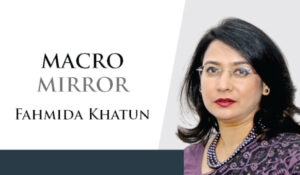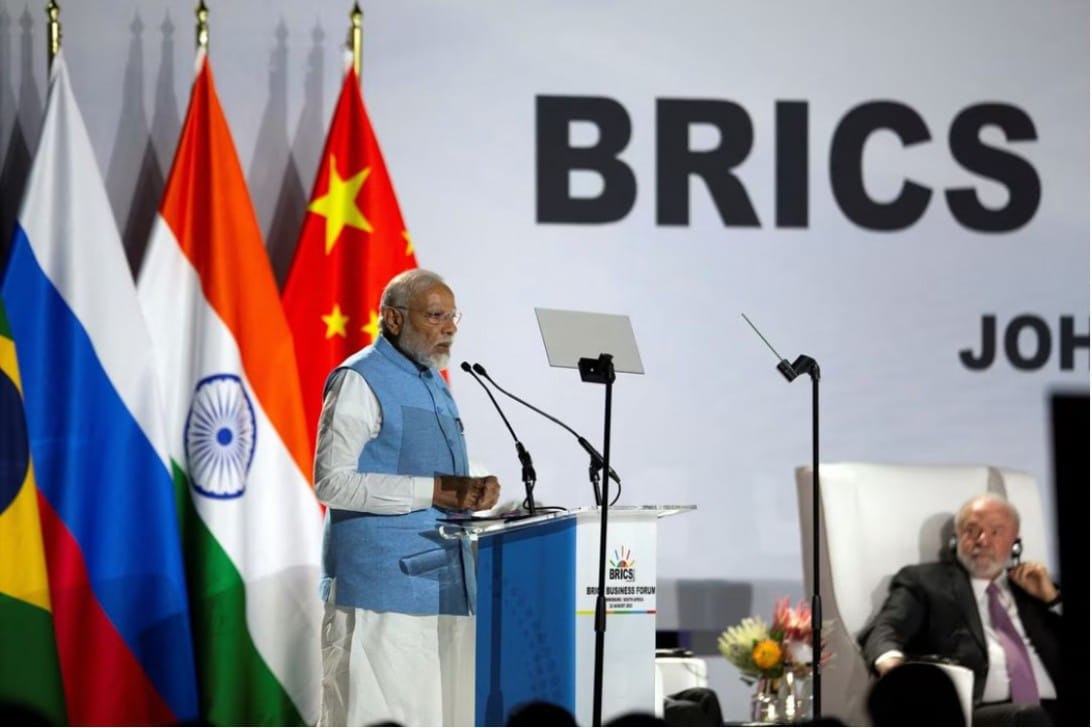Originally posted in The Daily Star on 29 August 2023
 The recently concluded 15th BRICS Summit generated a lot of discussion in Bangladesh as the country had expected to be a member of this bloc. The foreign minister, too, had said in June that Bangladesh was likely to become a member in August. However, it turned out that the country was not to join the bloc at the summit held in Johannesburg, South Africa on August 22-24. The leaders of the BRICS countries accepted only six new countries this time around: Iran, Saudi Arabia, United Arab Emirates (UAE), Argentina, Egypt, and Ethiopia. Their membership will be effective from January 1, 2024.
The recently concluded 15th BRICS Summit generated a lot of discussion in Bangladesh as the country had expected to be a member of this bloc. The foreign minister, too, had said in June that Bangladesh was likely to become a member in August. However, it turned out that the country was not to join the bloc at the summit held in Johannesburg, South Africa on August 22-24. The leaders of the BRICS countries accepted only six new countries this time around: Iran, Saudi Arabia, United Arab Emirates (UAE), Argentina, Egypt, and Ethiopia. Their membership will be effective from January 1, 2024.
Inclusion of new members in BRICS is considered to be a win-win situation in the current geopolitical and geo-economic circumstances. Initially, the formation of BRICS was seen as a balancing force in the geo-economic landscape, which is dominated by the Western economies. Emerging economies require trade, investment, finance, and technology to continue their growth momentum and fight challenges. As multilateral financial institutions such as the World Bank and International Monetary Fund (IMF) failed to respond to the needs of countries in the Global South and reform their governance, BRICS member countries established the New Development Bank (NDB) with a contribution of $50 billion by each BRICS member. Later, Bangladesh, the UAE, Egypt, and Uruguay were invited to be members of the NDB. Recently, BRICS members have also been exploring the possibility of new international currency arrangements for trading among themselves and reducing the dominance of the US dollar.

Indeed, the multilateral system has become ineffective to a large extent due to the rigid position of powerful Western countries. The multilateral trading system, multilateral development banks, and climate negotiations are some instances where the richer Northern countries have played a leading role in shaping the global agenda. In light of this, the focus of this year’s BRICS summit was “BRICS and Africa: Partnership for Mutually Accelerated Growth, Sustainable Development and Inclusive Multilateralism.” Member countries expressed concern over unilateral coercive measures used by certain countries and highlighted their commitment to inclusive multilateralism. They want to see improved global governance through a more efficient, representative, democratic, and accountable multilateral system. The members are also for a reform of the UN Security Council to have higher representation of developing countries.
At the summit, BRICS members called for a constructive role of multilateral financial institutions and international organisations in designing economic policies to regain the momentum of the global economy. As such, they committed to employment generation, including gender-responsive employment and social protection policies for sustainable development. In terms of climate actions, BRICS members highlighted the need for developing countries to access low-emission technologies and solutions to reduce greenhouse gas emissions and enhance climate adaptation actions. BRICS countries feel that meeting the development goals of countries and reconstructing post-conflict countries require support from the international community.
Even though it is hardly a homogeneous group, BRICS member countries can gain from each other’s strength on common issues, such as economic progress. If the economic agenda gains momentum, Bangladesh could also benefit by joining the grouping of the Global South. However, the ambit of economic cooperation has to expand beyond financial cooperation. Bangladesh’s participation in such blocs can be meaningful if it can improve its trade balance with its trading partners, particularly with China and India.
However, the influence of BRICS in global governance is still limited. Its motivation behind expanding its membership is to gain more strength and challenge the existing geo-economic and geopolitical order. Though the geopolitical aspect was not a declared objective, BRICS is gradually evolving into a geopolitical group. Though Brazil and India have not been enthusiastic about expanding the bloc, China wants the group’s voice to gain more strength in the global platform. However, this may not be easy as BRICS is composed of countries with diverse political and economic backgrounds. There are large developing democracies and also a one-party autocracy in the BRICS.
Though BRICS members were expected to be on a path of growth at the time of its establishment, the three countries besides China and India could not meet expectations as their economies slowed down despite their per capita income being higher than India. The newest six member countries also have varying economic backgrounds. Argentina is facing serious economic challenges while Ethiopia is a low-income country. And the UAE, Iran, and Saudi Arabia are oil-rich countries. The per capita incomes of these 11 countries range from about $1,000 to over $50,000.
Bangladesh’s interest in BRICS arises from various factors. Currently, Bangladesh is under tremendous pressure from Western countries to hold a free, fair, and inclusive national election. The country is also under pressure on account of human rights issues. On May 24, the US announced a new visa policy for Bangladeshi citizens, with the aim of pushing for a fair election. Under this policy, the US can restrict the issuance of visas for any Bangladeshi citizen who has undermined the democratic election process in the country. The recent visits of US high officials and EU delegations are also manifestations of Western pressure on the Bangladesh government. There is no doubt that the current political party in power needs allies. Inclusion in BRICS could have given it some moral strength to demonstrate that it is not alone and that it has friends who have a voice in global affairs. The original five members of BRICS are also members of the G20, which is a platform of 19 developed and developing countries and the European Union.
Though BRICS has made limited progress so far on the economic front, it has potential to dominate the global economy if it moves strategically. The group, with its original five members, already accounts for about 24 percent of global GDP in nominal terms, and about 31.6 percent in purchasing power parity (PPP) terms. This is higher than the G7 countries (France, United States, United Kingdom, Germany, Japan, Italy, and Canada), whose GDP in PPP terms is about 30.3 percent. BRICS also occupies 16 percent of global trade and includes 41 percent of the world’s population. Hence, the new members will only enhance the bloc’s strength.
Even though it is hardly a homogeneous group, BRICS member countries can gain from each other’s strength on common issues, such as economic progress. If the economic agenda gains momentum, Bangladesh could also benefit by joining the grouping of the Global South. However, the ambit of economic cooperation has to expand beyond financial cooperation. Bangladesh’s participation in such blocs can be meaningful if it can improve its trade balance with its trading partners, particularly with China and India. Bangladesh also needs more foreign direct investment, technology, and capacity development. The country stands to benefit substantially through the bloc only if these issues are on the BRICS agenda.
Dr Fahmida Khatun is executive director at the Centre for Policy Dialogue (CPD) and non-resident senior fellow of the Atlantic Council.

